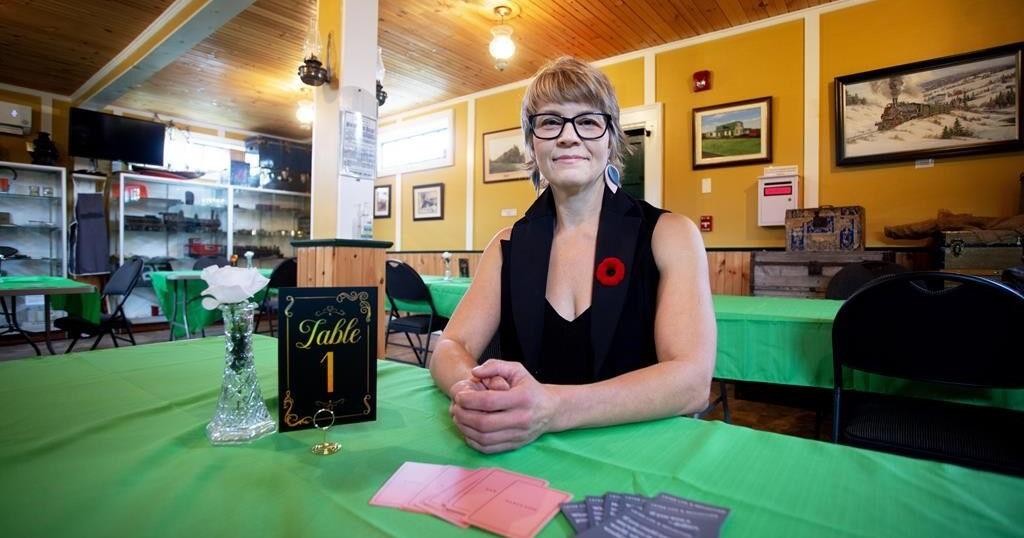AVONDALE, N.L. – The four women sipping tea around an antique wooden table in rural Newfoundland said they weren’t looking for much in a mate: kindness, humour, a good sense of fun and, ideally, a full set of teeth.
Sick of dating apps and with few places to meet men in person, the women were at a new speed-dating event for seniors at a railway station museum in Avondale, N.L., about 40 kilometres southwest of St. John’s.
They hoped to put down their phones, look someone in the eye and make a real connection.
“I’m retired. I babysit my grandpuppy, I go visit my single girlfriends. At my age, I’m like, OK, where do you go?” asked Daphne Simmons, 65. Her sense of humour had everyone at ease within minutes, even as a reporter watched them go on six-minute dates.
“If I was 40 or 30, I’d be downtown,” Simmons said, referring to St. John’s, where there are plenty of bars and clubs in which to catch someone’s eye. “I met my late husband downtown, and he was the best man that ever walked this Earth.”
Single men her age are exhausted too, she added. Those she has met through apps and websites have the same complaints trying to meet women.
“I might have to start crashing funerals,” Simmons joked.
It is widely agreed that dating can be difficult. The women in Avondale on a recent Friday afternoon bonded over a shared portfolio of horror stories that would make love-seekers of any age wince with recognition: online matches that will message but not meet, promising suitors that ultimately reveal they’re married or attached, and in-person dates with someone who looks nothing like their profile picture.
But older adults have added complications.
Jenny Temple organized the event in Newfoundland, in part because she’s hoping to find a match for her mother, Annie White, an elegant 75-year-old whose home-baked tea buns were so tasty at least one attendee hustled a few out of the building in a napkin at the end of the afternoon.
Temple teaches movement, yoga and nutrition classes for seniors in rural communities outside St. John’s, including Avondale, and she saw a need for some way other than the Plenty of Fish dating app for older adults to connect.
“I would hear the stories of people lonely, some are depressed, maybe they moved here and they don’t know anybody, so they’re even looking for just friendship,” Temple, 49, said in an interview after the event.
She saw, too, that ageism can be a barrier. Sometimes children or grandchildren disapprove of them dating, or dismiss it as silly, Temple said. Some older adults hold themselves back, worried people might think they’re dating too soon after the death of a spouse.
“There’s this whole mindset in society — we’re so used to seeing, even in the movies, younger people dating. You don’t see older adults,” she said. “So I thought, shag this, I’m going to give this a try.”
She named her event How Ya Gettin’ On after a popular Newfoundland expression for “How are you?”
Across the country in Victoria, dating coach Cherie MacCormack said watching older adults struggle to connect inspired her to start offering matchmaking services last month. She’s been coaching and hosting events for singles of all ages since 2013, and with a roster of more than 1,400 past clients, she figured she could do more to help people find love.
Older adults aren’t looking for someone to buy a house or have children with. Instead, they approach relationships with a wealth of life experience, and they’re hoping to find someone with common interests to spend time with, the 52-year-old said in an interview.
That life experience often means older adults know exactly what they need in a partner, and what they don’t want, she said. But sometimes, past heartbreak — divorce, death — can make them more hesitant to trust someone new.
“Everyone deserves to have a life partner,” she said. “I would love to find love for people in their 80s and 90s. I don’t think it matters how old you are, there’s somebody out there for everyone.”
In Avondale, Simmons smiled as she came back from her speed-dating round with the men at the event. “It was good,” she said, still smiling, but otherwise tight-lipped.
In all, eight women and three men took part. Temple was hoping for higher numbers — 25 men and 25 women would be ideal, she said — but it was only the first event. The next one is planned for St. John’s.
There was at least one big win: several of the attendees left the event together and went to a local bar to hear a band play. Regardless of whether any of them wind up dating, they had still become friends.
“It’s just pure joy to be honest,” Temple said. “Because I know some of their stories, the loneliness. And now, when they leave here today, they might have somebody to call upon that they didn’t have before.”
This report by The Canadian Press was first published Nov. 17, 2024.
